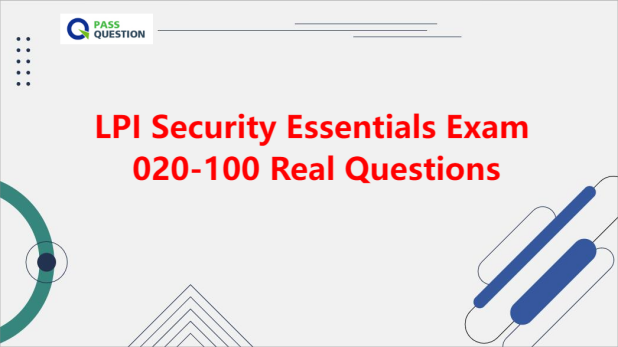LPI Security Essentials Exam 020-100 Real Questions
The LPI Security Essentials 020-100 certification serves as a stepping stone to a gratifying and prosperous career in the ever-evolving field of cybersecurity. PassQuestion offers the most up-to-date and comprehensive LPI Security Essentials Exam 020-100 Real Questions, designed to equip you with the knowledge and confidence to excel in the exam. By utilizing our LPI Security Essentials Exam 020-100 Real Questions, you will gain a clear and concise understanding of the actual exam scenario. This invaluable resource not only enhances your comprehension of the subject matter but also empowers you to excel in the LPI Linux Essentials exam on your first attempt.

Linux Professional Institute Security Essentials
IT security is crucial for individuals and organizations in today’s digital world. The general ability to protect data, devices and networks is a fundamental skill for the responsible use of information technology. Obtaining the Linux Professional Institute Security Essentials certificate is a fantastic way to learn how to protect yourself and to demonstrate your knowledge and expertise in the field to potential employers and clients.
The Security Essentials exam covers preliminary knowledge in all important fields of IT security. The certificate is intended for students who had their first course in IT security, for all members and staff of organizations that want to improve their IT security as well as for individuals who want to attain a basic competence in the secure use of information technology.
To receive the Security Essentials certificate the candidate must:
- have a basic understanding of common security threats of using computers, networks, connected devices, and IT services on premises and in the cloud;
- understand common ways to prevent and mitigate attacks against their personal devices and data;
- be able to use encryption to secure data transferred through a network and stored on storage devices and in the cloud;
- be able to apply common security best practices, protect private information, and secure their identity; and
- able to securely use IT services and to take responsibility for securing their personal computing devices, applications, accounts, and online profiles.
Exam Information
Current version: 1.0 (Exam code 020-100)
Objectives: 020-100
Prerequisites: There are no prerequisites for this certification
Requirements: Pass the Security Essentials 020 exam
Exam format: 40 questions and must be completed within 60 minutes
Validity period: Lifetime
Languages: English, Japanese
Security Essentials Exam 020 Objectives
021 Security Concepts
- 021.1 Goals, Roles and Actors
- 021.2 Risk Assessment and Management
- 021.3 Ethical Behavior
022 Encryption
- 022.1 Cryptography and Public Key Infrastructure
- 022.2 Web Encryption
- 022.3 Email Encryption
- 022.4 Data Storage Encryption
023 Device and Storage Security
- 023.1 Hardware Security
- 023.2 Application Security
- 023.3 Malware
- 023.4 Data Availability
024 Network and Service Security
- 024.1 Networks, Network Services and the Internet
- 024.2 Network and Internet Security
- 024.3 Network Encryption and Anonymity
025 Identity and Privacy
- 025.1 Identity and Authentication
- 025.2 Information Confidentiality and Secure Communication
- 025.3 Privacy Protection
View Online LPI Security Essentials Exam 020-100 Free Questions
1. As the IT administrator of a company, you are responsible for implementing a cloud storage solution. You need to consider the potential issues related to the use of cloud services, especially concerning data synchronization and accessibility.
Which of the following should you be particularly aware of when deploying the cloud storage solution?
A. Data loss prevention
B. Encryption at rest
C. Data redundancy
D. Dependence on Internet connection
Answer: D
2. You find an RFID card on the ground outside your office building. What should you do with the card?
A. Leave the card where it is and ignore it
B. Use the card to gain access to the building
C. Report the lost card to the building security office
D. Take the card home and keep it for yourself
Answer: C
3. How are passwords typically stored in online services?
A. As encoded base64 strings
B. Using password hashing and salting
C. Using reversible encryption
D. In plain text
Answer: B
4. Which of the following activities is a potential threat to the confidentiality of personal information and involves collecting data from various sources, such as online services and social media, for malicious purposes?
A. Information gathering
B. Data mining
C. Social engineering
D. Two-factor authentication
Answer: A
5. Which of the following legal concepts is concerned with compensating someone for harm caused by a security breach?
A. Public law
B. Copyright law
C. Financial compensation claims
D. Liability
Answer: D
6. You suspect that someone has gained unauthorized remote access to your computer. Which of the following should you do first?
A. Delete all files on your computer
B. Disconnect your computer from the internet
C. Reboot your computer
D. Run a malware scan using reputable software
Answer: B
7. What is the term used to describe the unique identifier assigned to a user's web browser?
A. HTTP cookies
B. Script blockers
C. Ad blockers
D. Browser fingerprinting
Answer: D
8. You work for a large company that has employees who need to access the company network from remote locations. Which of the following solutions would be the most appropriate for providing secure remote access?
A. An organization-specific VPN
B. Setting up an open Wi-Fi network
C. Using plaintext email for communication
D. Relying on FTP for file transfers
Answer: A
9. Which of the following encryption methods is an example of symmetric encryption?
A. RSA
B. Elliptic Curve Cryptography
C. AES (Advanced Encryption StandarD.
D. MD5
Answer: C
10. What is a prevalent principle in copyright law that allows limited use of copyrighted material without requiring permission from the rights holder?
A. Public domain
B. Fair use
C. Infringement
D. Derivative work
Answer: B
- TOP 50 Exam Questions
-
Exam
All copyrights reserved 2025 PassQuestion NETWORK CO.,LIMITED. All Rights Reserved.

